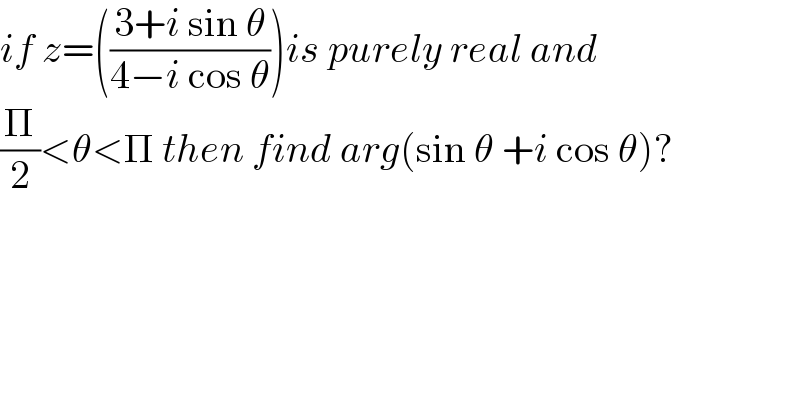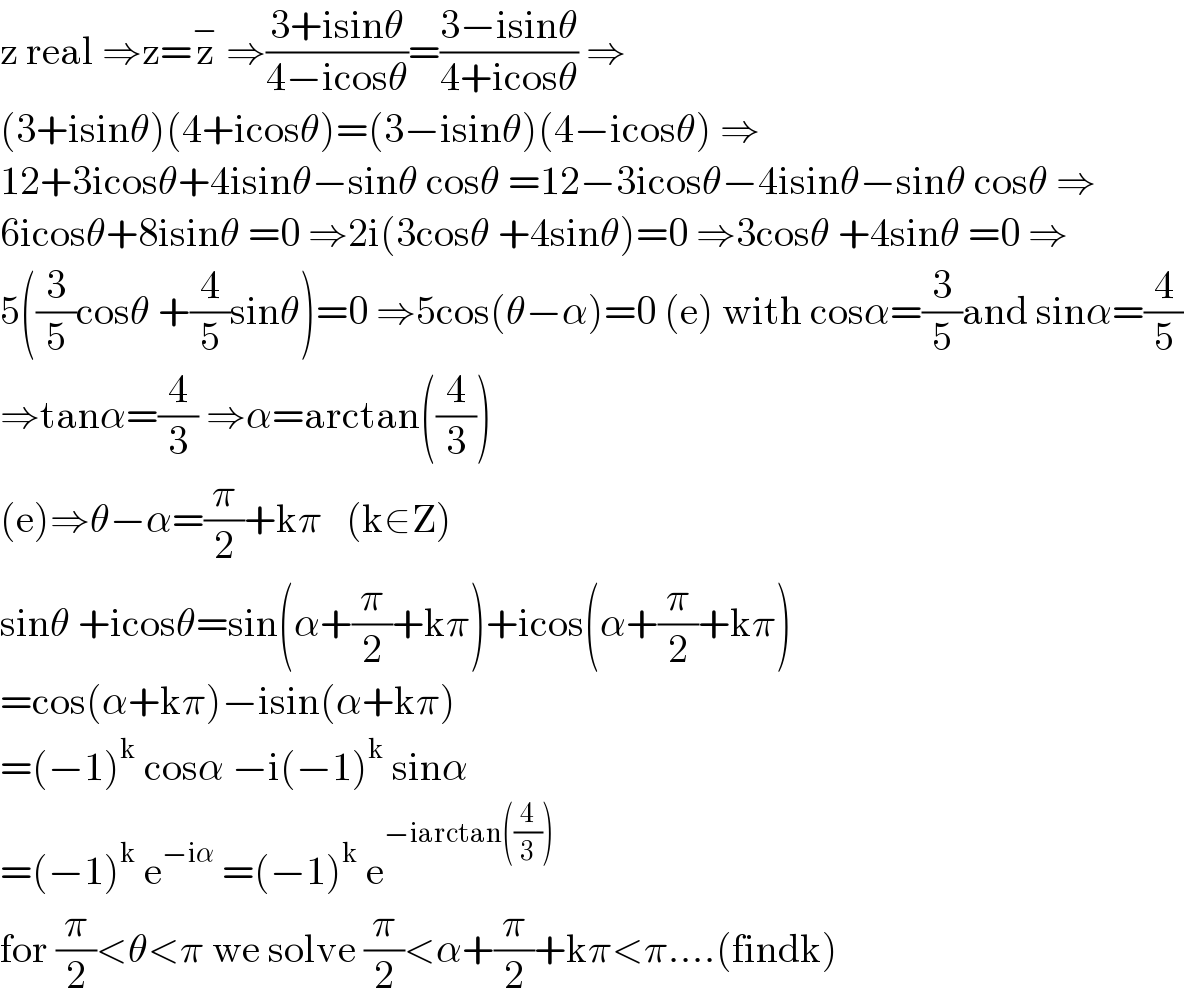
Question Number 145763 by gsk2684 last updated on 07/Jul/21

$${if}\:{z}=\left(\frac{\mathrm{3}+{i}\:\mathrm{sin}\:\theta}{\mathrm{4}−{i}\:\mathrm{cos}\:\theta}\right){is}\:{purely}\:{real}\:{and}\: \\ $$$$\frac{\Pi}{\mathrm{2}}<\theta<\Pi\:{then}\:{find}\:{arg}\left(\mathrm{sin}\:\theta\:+{i}\:\mathrm{cos}\:\theta\right)? \\ $$
Answered by mathmax by abdo last updated on 08/Jul/21

$$\mathrm{z}\:\mathrm{real}\:\Rightarrow\mathrm{z}=\overset{−} {\mathrm{z}}\:\Rightarrow\frac{\mathrm{3}+\mathrm{isin}\theta}{\mathrm{4}−\mathrm{icos}\theta}=\frac{\mathrm{3}−\mathrm{isin}\theta}{\mathrm{4}+\mathrm{icos}\theta}\:\Rightarrow \\ $$$$\left(\mathrm{3}+\mathrm{isin}\theta\right)\left(\mathrm{4}+\mathrm{icos}\theta\right)=\left(\mathrm{3}−\mathrm{isin}\theta\right)\left(\mathrm{4}−\mathrm{icos}\theta\right)\:\Rightarrow \\ $$$$\mathrm{12}+\mathrm{3icos}\theta+\mathrm{4isin}\theta−\mathrm{sin}\theta\:\mathrm{cos}\theta\:=\mathrm{12}−\mathrm{3icos}\theta−\mathrm{4isin}\theta−\mathrm{sin}\theta\:\mathrm{cos}\theta\:\Rightarrow \\ $$$$\mathrm{6icos}\theta+\mathrm{8isin}\theta\:=\mathrm{0}\:\Rightarrow\mathrm{2i}\left(\mathrm{3cos}\theta\:+\mathrm{4sin}\theta\right)=\mathrm{0}\:\Rightarrow\mathrm{3cos}\theta\:+\mathrm{4sin}\theta\:=\mathrm{0}\:\Rightarrow \\ $$$$\mathrm{5}\left(\frac{\mathrm{3}}{\mathrm{5}}\mathrm{cos}\theta\:+\frac{\mathrm{4}}{\mathrm{5}}\mathrm{sin}\theta\right)=\mathrm{0}\:\Rightarrow\mathrm{5cos}\left(\theta−\alpha\right)=\mathrm{0}\:\left(\mathrm{e}\right)\:\mathrm{with}\:\mathrm{cos}\alpha=\frac{\mathrm{3}}{\mathrm{5}}\mathrm{and}\:\mathrm{sin}\alpha=\frac{\mathrm{4}}{\mathrm{5}} \\ $$$$\Rightarrow\mathrm{tan}\alpha=\frac{\mathrm{4}}{\mathrm{3}}\:\Rightarrow\alpha=\mathrm{arctan}\left(\frac{\mathrm{4}}{\mathrm{3}}\right) \\ $$$$\left(\mathrm{e}\right)\Rightarrow\theta−\alpha=\frac{\pi}{\mathrm{2}}+\mathrm{k}\pi\:\:\:\left(\mathrm{k}\in\mathrm{Z}\right) \\ $$$$\mathrm{sin}\theta\:+\mathrm{icos}\theta=\mathrm{sin}\left(\alpha+\frac{\pi}{\mathrm{2}}+\mathrm{k}\pi\right)+\mathrm{icos}\left(\alpha+\frac{\pi}{\mathrm{2}}+\mathrm{k}\pi\right) \\ $$$$=\mathrm{cos}\left(\alpha+\mathrm{k}\pi\right)−\mathrm{isin}\left(\alpha+\mathrm{k}\pi\right) \\ $$$$=\left(−\mathrm{1}\right)^{\mathrm{k}} \:\mathrm{cos}\alpha\:−\mathrm{i}\left(−\mathrm{1}\right)^{\mathrm{k}} \:\mathrm{sin}\alpha \\ $$$$=\left(−\mathrm{1}\right)^{\mathrm{k}} \:\mathrm{e}^{−\mathrm{i}\alpha} \:=\left(−\mathrm{1}\right)^{\mathrm{k}} \:\mathrm{e}^{−\mathrm{iarctan}\left(\frac{\mathrm{4}}{\mathrm{3}}\right)} \\ $$$$\mathrm{for}\:\frac{\pi}{\mathrm{2}}<\theta<\pi\:\mathrm{we}\:\mathrm{solve}\:\frac{\pi}{\mathrm{2}}<\alpha+\frac{\pi}{\mathrm{2}}+\mathrm{k}\pi<\pi....\left(\mathrm{findk}\right) \\ $$
Commented by gsk2684 last updated on 08/Jul/21

$${thank}\:{you}\: \\ $$
Commented by mathmax by abdo last updated on 09/Jul/21

$$\mathrm{you}\:\mathrm{are}\:\mathrm{welcome} \\ $$
